Key takeaways:
- Strong passwords are essential for protecting personal information and act as a first line of defense against cyber threats.
- Utilizing a password manager can simplify the creation and management of unique, complex passwords for various accounts.
- Creating passphrases can enhance memorability while maintaining strong security by personalizing the password creation process.
- Consistent use of unique passwords for each account is crucial to prevent cascading issues like identity theft from a single compromise.
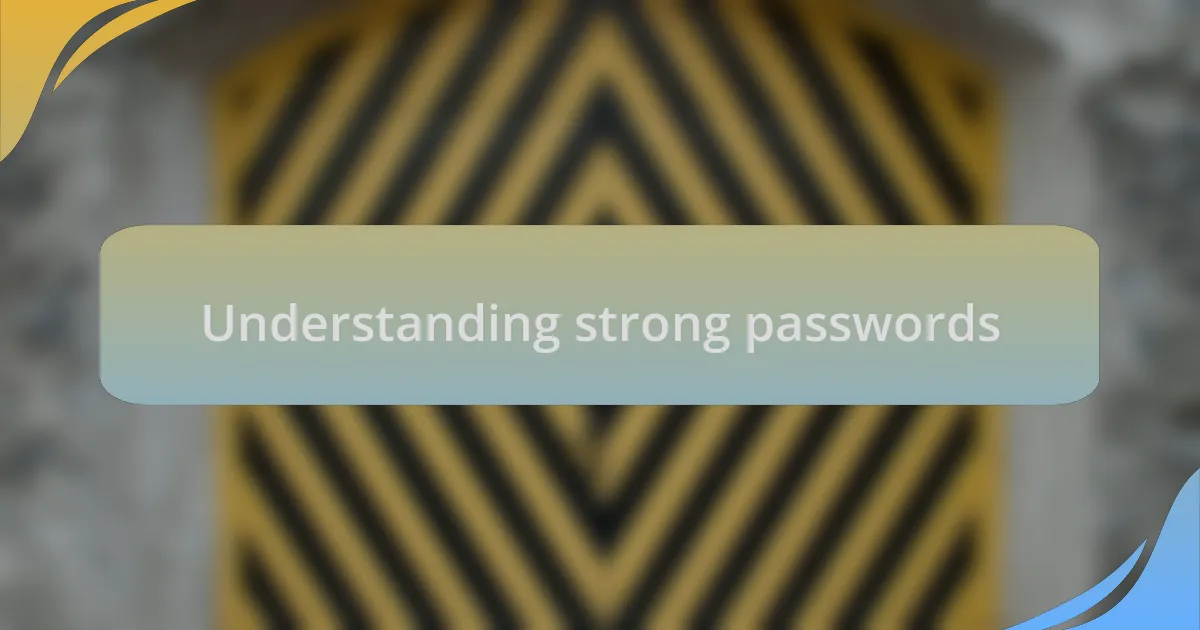
Understanding strong passwords
When I first started using strong passwords, I underestimated their importance. I remember feeling frustrated as I juggled between complex combinations of letters, numbers, and symbols. But over time, I realized that these seemingly tedious requirements served a crucial purpose: protecting my personal and sensitive information. How many times have we heard about data breaches that could have been avoided with stronger passwords?
Strong passwords are more than just a mix of characters; they create a barrier against cyber threats. For instance, I once encountered an issue when a friend’s account was compromised due to a simple password. This experience opened my eyes. It cemented my understanding that passwords should be long, unique, and unpredictable. It’s not just about creating something that’s difficult to guess; it’s about creating peace of mind in an increasingly digital world.
From my perspective, a strong password isn’t just a string of characters; it’s a vital element of my digital security strategy. I often find myself thinking, what if I had lost access to my accounts? That thought alone urges me to prioritize creating complex passwords, using a mix of uppercase, lowercase, symbols, and numbers. Each time I craft a new one, I see it as a shield, guarding my privacy and personal data against intruders lurking in the shadows of the internet.
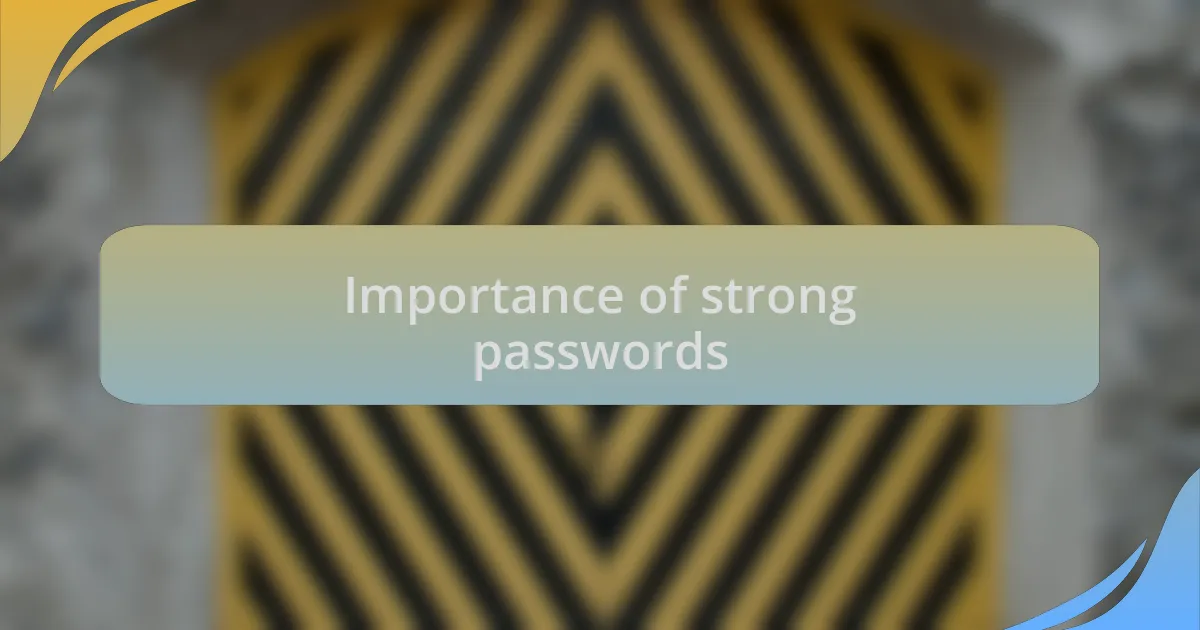
Importance of strong passwords
Strong passwords truly serve as the first line of defense in our digital lives. I still vividly recall a time when I neglected this aspect and faced the dire consequences of a hacked email account. The sheer panic of realizing that my personal conversations and sensitive information could be in someone else’s hands was enough to make anyone shiver.
Reflecting on that experience, it became clear to me that a strong password isn’t just about complexity; it provides a sense of security that we often take for granted. Think about it—how many times have you felt that reassuring sense of control when you know your accounts are well-protected? It’s empowering, and it encourages us to be more proactive about our digital habits.
Moreover, I’ve found that many people underestimate the risks associated with weak passwords. It’s frustrating to hear friends say things like “I just use the same one everywhere; it’s easier to remember.” But isn’t it worth taking a little extra time to protect our identities? The truth is, a strong password can effectively deter cybercriminals and safeguard our personal information in an increasingly interconnected world.
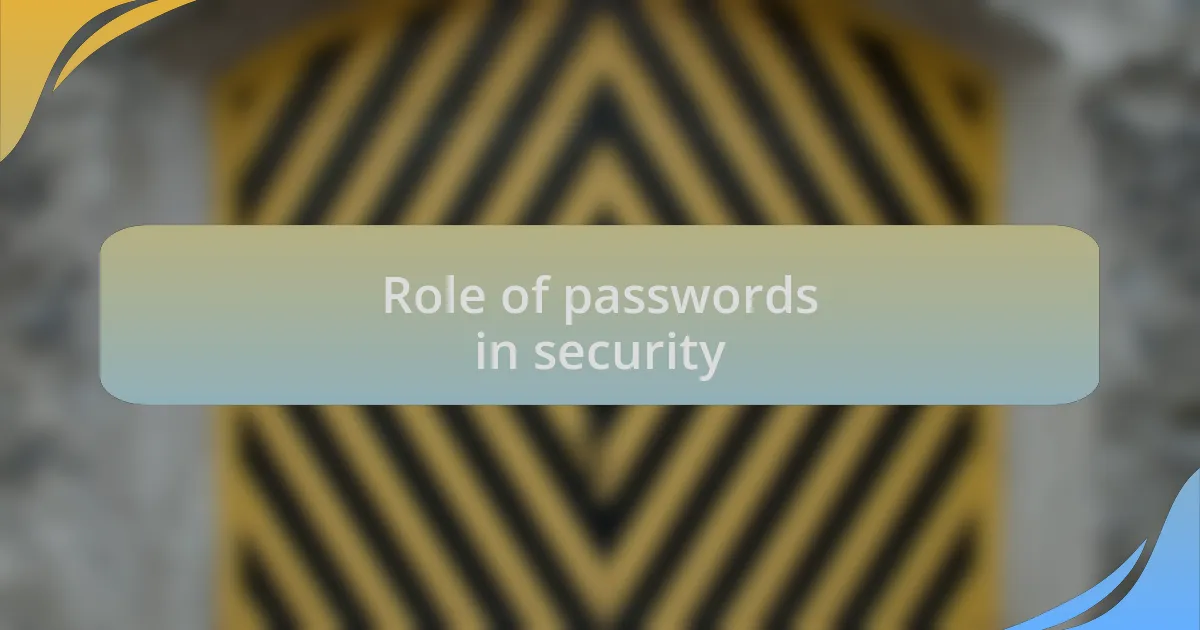
Role of passwords in security
As I reflect on the role of passwords in security, I realize that they act as the gatekeepers to our online identities. I remember a colleague who thought their simple password was “good enough,” only to find themselves locked out of their financial accounts after a breach. That incident not only cost them time and money but also the peace of mind that I now value deeply in my own digital life.
In my experience, strong passwords are vital in building our defenses against cyber threats. When I first started using a password manager, I felt an immediate weight lift off my shoulders. Suddenly, I could create unique passwords for every account without the stress of trying to remember them all. Isn’t it fascinating how adopting simple tools can dramatically enhance our security?
Ultimately, passwords play a crucial role in maintaining our privacy and safety in an increasingly digital society. I often wonder how many people understand that a single compromised password could set off a chain reaction of issues, potentially leading to identity theft. Each time I create one, I remind myself it’s more than just letters and numbers; it’s my barrier against unwanted intrusion and a key to my digital freedom.
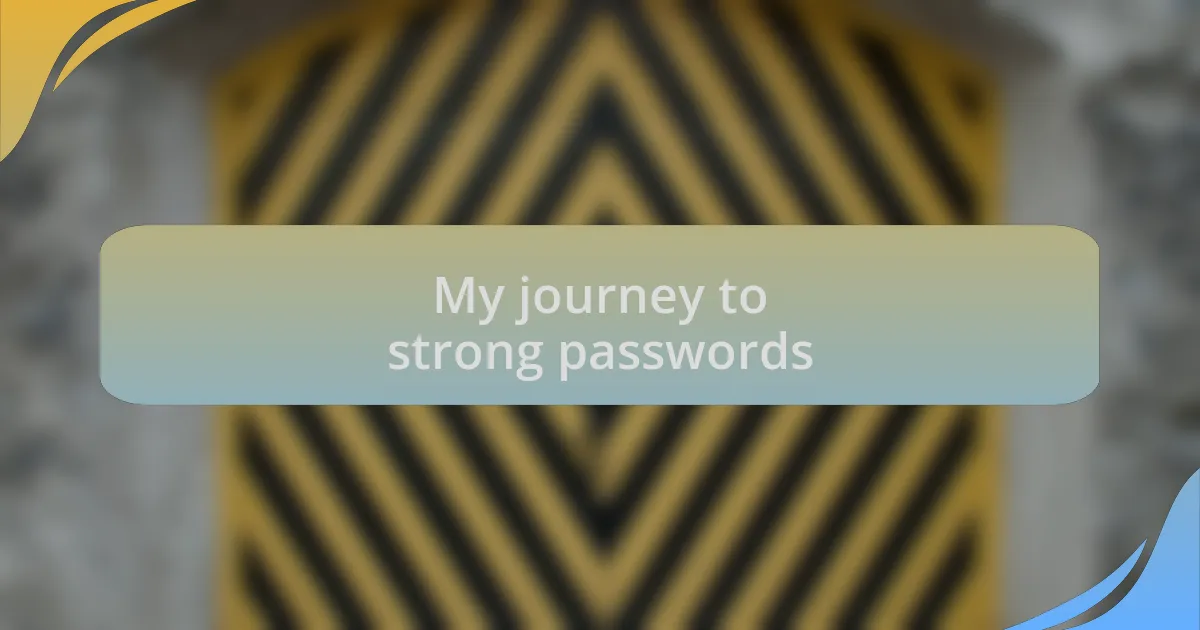
My journey to strong passwords
As I embarked on my journey to strong passwords, I vividly recall the moment when I realized how vulnerable I truly was. After hearing about a friend’s account being hacked due to a weak password, I thought, “What if that were me?” That moment ignited a determination to overhaul my approach, making password security a personal priority.
Initially, I stumbled through the complexities of creating strong passwords. I experimented with long phrases, trying to find the balance between security and memorability. I still remember the satisfaction of crafting my first truly secure password and the pride that came with taking control of my digital safety. It was a small victory, but one that left me feeling empowered in a world where online threats constantly loom.
Now, armed with my password manager, I find it incredibly liberating to generate complex passwords for each of my accounts. Reflecting on my evolution in this aspect of cybersecurity, I often ask myself: “How did I manage before?” The anxiety I used to feel about my online security feels like a distant memory, replaced by a sense of confidence that comes from being proactive about protection.
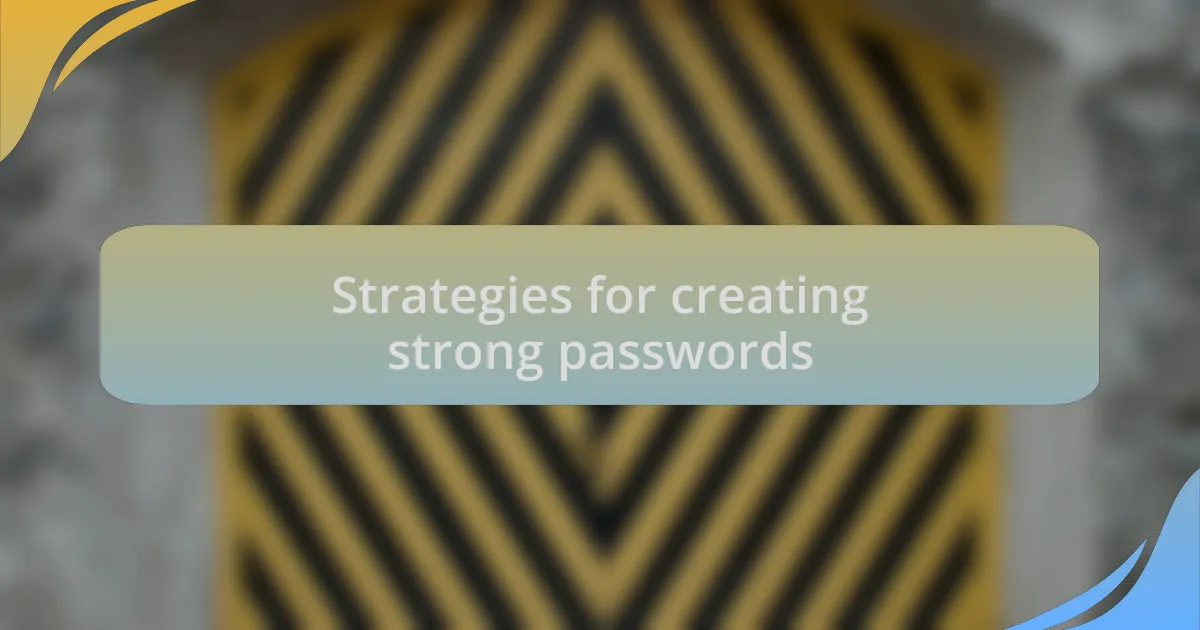
Strategies for creating strong passwords
When I began focusing on password strategies, I quickly learned the importance of length. A password with at least 12 characters can significantly enhance security. I often ask myself, “Why settle for something simple when I can create a fortress?” The more characters I include, the better protected I feel.
Another effective strategy I’ve adopted is mixing different types of characters: uppercase and lowercase letters, numbers, and special symbols. For instance, I once turned a favorite quote into a unique password framework. Using “To Be or Not to Be” became “2B&Not2B!” This approach transformed a familiar phrase into a strong password that I can remember easily—while still being complex enough to deter attackers.
Lastly, I firmly believe in the power of unique passwords for every account. Initially, I found it daunting, but I started using a password manager which helped reduce the mental load of remembering each one. Think about how liberating it is to have different, strong passwords across platforms! With each secure password I generate, I feel like I’m building my own protective wall in this digital landscape.
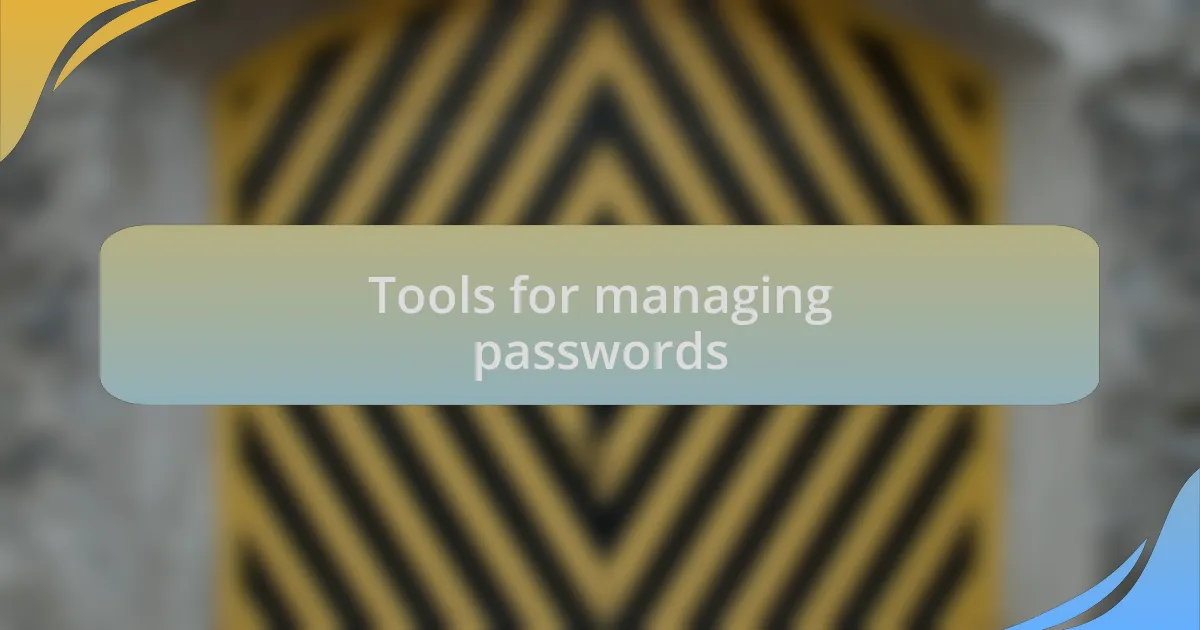
Tools for managing passwords
Using tools to manage passwords has transformed my approach to online security. I remember the first time I tried a password manager—initially, it felt strange to trust software with something so personal. But once I saw how it generated long, complex passwords for me, I was hooked. Could anything be easier than letting a program handle all that complexity?
I now lean heavily on features like password vaults and autofill options. This has made logging into accounts a breeze. Just the other day, when I had to access a new service, I realized I could let the password manager handle the registration process. I didn’t need to think of a single password, which freed up my mind for other important tasks.
Moreover, getting alerts about weak or reused passwords has been a game changer. It’s like having a vigilant guardian watching over my digital world. Recently, I was nudged to update a password I’d been using for too long. I felt a mix of gratitude and relief, knowing my tools were proactive in keeping my information safe. Isn’t it reassuring to have that level of oversight in a time when cyber threats are everywhere?

Lessons learned from my experience
The first lesson I learned is the importance of consistency in password management. I used to believe that reusing a few strong passwords was sufficient. However, after an unsettling experience where one of my accounts was compromised, I realized that even the strongest password can become a liability if repeated across multiple sites. This taught me the value of unique passwords for each account, an adjustment I now take seriously.
Another significant insight came from understanding the psychology behind password creation. Initially, I would struggle to remember complex sequences. But I discovered that crafting a passphrase—a simple sentence transformed into a unique password—made memorization much easier. For instance, I shifted to using phrases like “Baking3xPerWeek!” which reflects my passion for cooking but remains hard for others to guess. This realization emphasized how personalizing my passwords not only enhanced security but also made them more relatable to me.
Ultimately, patience proved crucial in my password journey. I once faced a frustrating period of constantly forgetting passwords, but I learned to embrace this challenge. Instead of feeling defeated, I approached it as an opportunity to refine my system. With each reset, I became more adept at balancing security with accessibility. This process taught me that a secure online presence is an ongoing commitment rather than a one-time endeavor. How valuable it is to view password management as part of a proactive strategy rather than just a chore!